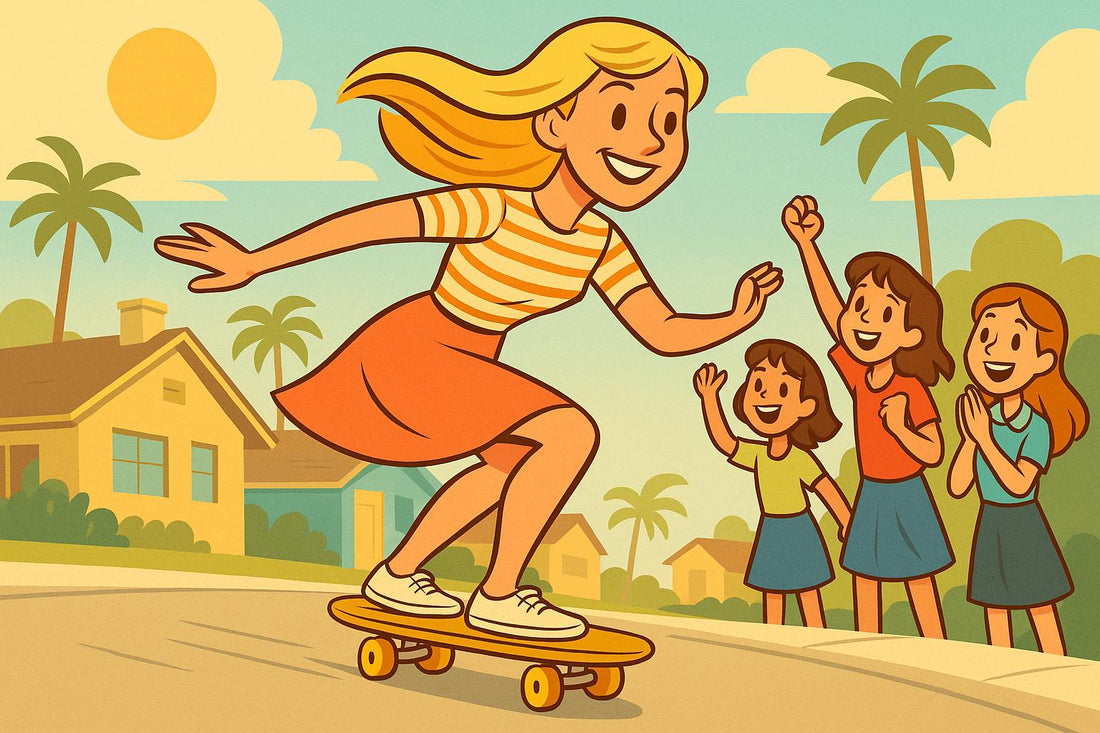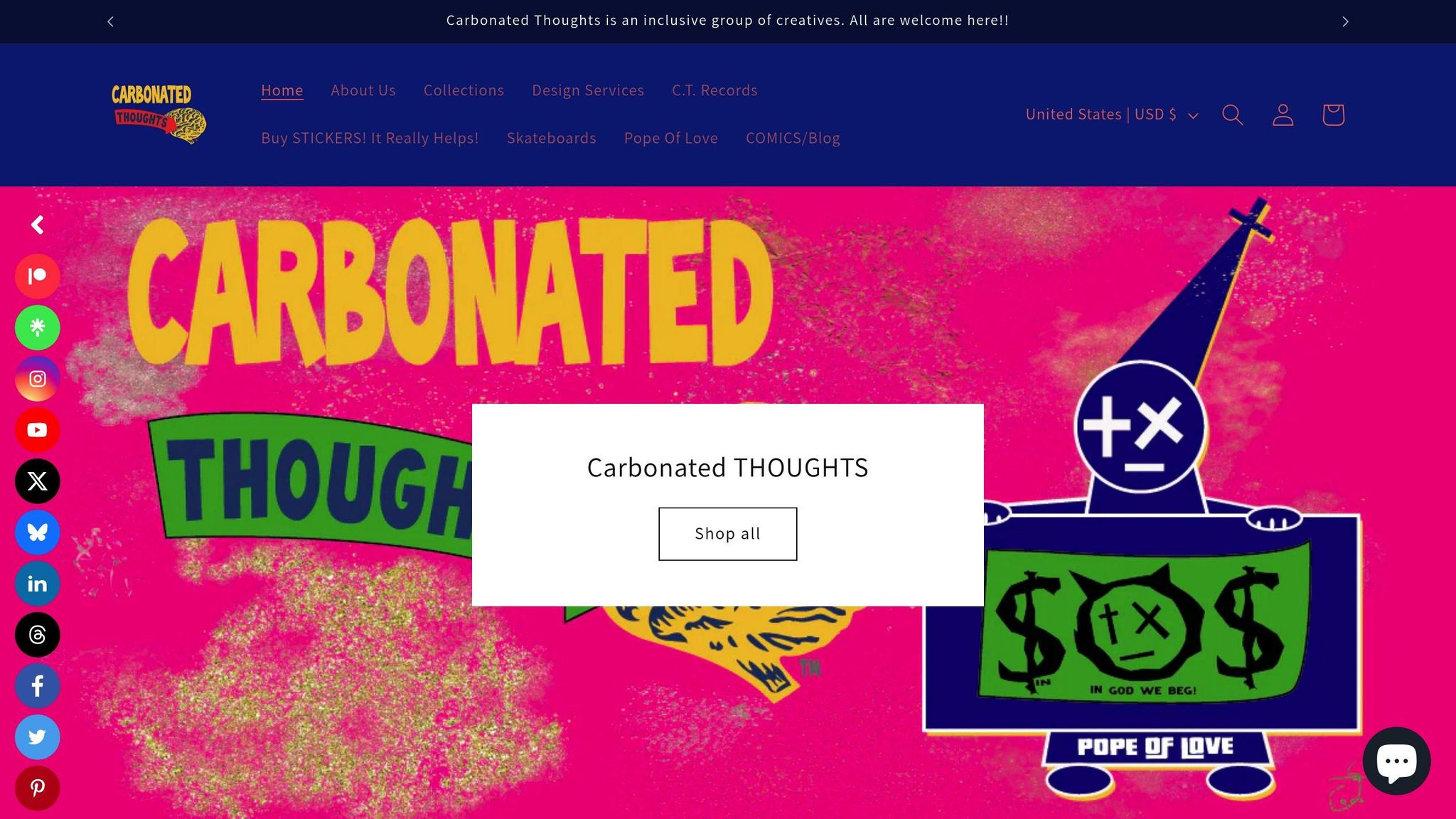
Patti McGee and the Rise of Women in Skateboarding
Share
Patti McGee broke barriers as the first professional female skateboarder in the 1960s, proving skateboarding wasn’t just for men. Her achievements included winning the 1964 National Skateboard Championships, gracing the cover of LIFE magazine with her iconic handstand, and becoming the first woman inducted into the Skateboarding Hall of Fame. She inspired generations of women to take up skateboarding, challenging stereotypes and opening doors for inclusivity in the sport.
Key Highlights:
- First Pro Female Skateboarder: Signed a $250/month contract in 1965.
- National Champion: Won the 1964 National Skateboard Championships.
- Media Icon: Featured on LIFE magazine’s cover in May 1965.
- Legacy: Inducted into the Skateboarding Hall of Fame in 2010.
McGee’s story remains a testament to determination and continues to inspire female skaters worldwide.
Outsiders: Patti McGee | Womanica
Patti McGee's Early Life and Path to Skateboarding
Growing up in Southern California during the 1950s, Patti McGee was surrounded by the thriving world of board sports. Her transition from surfing to skateboarding felt like a natural step, influenced by her family and the vibrant surf culture of the time. These early experiences would set the stage for her groundbreaking role in shaping skateboarding for women.
From Surfing to Skateboarding
Patti’s journey into board sports began with surfing. At just 13 years old in 1958, she embraced the surf culture of La Jolla, becoming part of the Pump House Gang. When the waves were calm, skateboarding became her go-to way to keep practicing. A pivotal moment came when her brother Jack crafted her very first skateboard in his wood shop, repurposing wheels from her rink skates. As Patti fondly remembered:
"My first board was one my brother Jack made in his wood shop using wheels from my rink skates."
Jack’s enthusiasm was contagious, and his call to try the board sparked what would become a lifelong passion:
"Come out here! You have to try this!" – Patti McGee
Patti quickly began experimenting with homemade boards. By her senior year of high school in 1962, skateboarding had become a regular part of her life alongside surfing. These early experiences marked the beginning of her deep connection to the sport.
The San Diego Scene: Building a Skateboarding Pioneer
In the early 1960s, San Diego’s skateboarding community thrived on creativity and resourcefulness. With no skate parks in sight, skaters like Patti found their own spots to practice and push boundaries. Patti often rode a "Bun Buster" skateboard equipped with Chicago wheels and, like many skaters of that era, preferred skating barefoot for a better feel of the board.
Patti and her brother Jack, both members of the Bun Busters team, were at the heart of this grassroots movement. The local scene was fueled by camaraderie and a shared passion for trying new tricks. Places like Ocean Beach and Pacific Beach offered smooth surfaces and a laid-back vibe, perfect for skating. One of the most challenging and exciting spots was the Concourse parking garage in downtown San Diego, where skaters had to adapt to different surfaces and conditions. These experiences not only shaped Patti’s skills but also prepared her for the national stage, where she would later stand out as a true innovator in the sport.
Patti McGee's Career Achievements
Patti McGee's journey from a skater in San Diego to a national figure reshaped the world of skateboarding, especially for women. Her triumphs in the mid‑1960s not only earned her accolades but also challenged and changed how women were seen in the sport. With her victories, she carved out a path filled with historic milestones.
1964 National Women's Skateboard Champion
One of Patti's defining moments came in 1964 at the first National Skateboard Championships held in Santa Monica, California. Patti wowed the crowd and judges alike with her signature handstand, securing the title. This victory was a landmark, as it was the first time a woman claimed a national skateboarding championship, signaling the start of a new chapter for the sport.
The First Professional Female Skateboarder
After her groundbreaking win, Patti's career hit another high point in 1965 when she became the first professional female skateboarder. Hobie/Vita-Pakt signed her to a contract that paid $250 a month, along with covering her expenses - a significant acknowledgment of her skill and potential at the time. As a professional, Patti toured the country, performing skateboarding demonstrations that proved the sport was open to everyone, regardless of gender. Her new role as a professional athlete also brought media opportunities that amplified her impact nationwide.
Media Spotlight and Records
Patti's fame soared in May 1965 when she graced the cover of Life magazine, showcasing her signature handstand on a skateboard. This iconic image brought skateboarding into the mainstream and led to appearances on popular television shows like The Tonight Show Starring Johnny Carson, The Mike Douglas Show, and What's My Line?.
She also set a world speed record for women’s skateboarding in 1964, reaching an impressive 47 miles per hour. In 1965, she became the first woman featured on the cover of Skateboarder Magazine in its fourth issue. Patti's influence extended to live events as well, performing at the Dick Clark World Teen Fair in 1966 before an audience of 45,000 young fans.
These achievements not only solidified Patti McGee's legacy in skateboarding history but also inspired a new generation of young girls to pick up a skateboard and redefine the sport on their own terms.
Patti McGee's Influence on Women in Skateboarding
In the 1960s, Patti McGee shattered the notion that skateboarding was a boys-only activity, opening the door for women to take their place in the sport. Her impact went far beyond her competitive achievements, reshaping how society viewed women's roles in action sports and inspiring countless girls to grab a skateboard and carve their own path.
Changing Gender Norms in Skateboarding
Back in the 1960s, skateboarding was largely seen as something for boys. Then came Patti McGee, joining the Hobie team - a group that, until her arrival, was made up entirely of boys. Her presence was a game-changer, challenging the gender stereotypes of the time. McGee's success proved that skill and athleticism weren't tied to gender, and that women could excel in the sport just as much as men.
Her victories and public visibility sent a powerful message during an era when opportunities for women in sports were limited. Whether it was gracing the pages of skateboarding magazines, appearing on television, or performing live demonstrations, McGee showed young girls everywhere that skateboarding wasn't just for boys. She didn't just break into the sport - she redefined it, inspiring a wave of girls to step onto skateboards for the first time.
Inspiration for Future Female Skateboarders
McGee’s influence didn’t stop at breaking barriers; she became a symbol of possibility for generations of female skaters. Her groundbreaking appearance on the cover of LIFE magazine in May 1965, where she nailed her signature handstand on a skateboard, brought skateboarding into the homes of millions of Americans. Suddenly, skateboarding wasn’t just inclusive - it was cool.
Her appearances on popular shows like The Tonight Show Starring Johnny Carson and The Mike Douglas Show further cemented her role as a trailblazer. And when she performed at the 1966 Dick Clark World Teen Fair in front of 45,000 young fans, she sparked a movement. Girls across the country saw her, admired her, and thought, “I can do that too.”
Even after her competitive days, McGee continued to make waves. She launched The Original Betty Skateboard Company, a brand designed to support female skateboarders and encourage women to embrace the sport. Events like the Mighty Mama Skate-O-Rama, where she participated, kept skateboarding's inclusive spirit alive and well. More recently, her story has reached younger audiences through the children's book There Goes Patti McGee!, ensuring her legacy continues to inspire the next generation of skaters.
Recognition and Lasting Legacy
The skateboarding world hasn’t forgotten Patti McGee's contributions. In 2010, she became the first woman inducted into the Skateboarding Hall of Fame - a recognition of her groundbreaking role in the sport. This honor wasn’t just about her competitive wins; it was about the doors she opened for female skateboarders everywhere.
Today, every girl who steps onto a skateboard owes a nod to McGee. The opportunities available in women’s skateboarding - whether it’s street skating, vert competitions, or even Olympic events - trace back to the barriers she broke in the 1960s.
Her story is a testament to the power of challenging expectations. Patti McGee didn’t just claim a spot for herself in skateboarding; she transformed the culture of the sport, making it a place where everyone, regardless of gender, could belong. Her courage and determination continue to roll forward, inspiring skaters of all ages and backgrounds to this day.
sbb-itb-e116ef9
The Evolution of Women in Skateboarding: Then and Now
Since Patti McGee burst onto the scene in the 1960s, women’s skateboarding has come a long way - though the journey has been anything but smooth.
Progress Over the Decades
Back in 1965, Patti McGee was earning $250 a month as a professional skateboarder. That paycheck, impressive for its time, hinted at the sport’s potential to grow commercially, even though McGee’s success was often treated as a novelty in a male-dominated space.
By the 1970s, skateboarding culture had shifted, becoming more intense and exclusionary. Boys often took over empty pools for skating, leaving girls on the sidelines, assuming they couldn’t handle the rougher atmosphere. Change began to take root in the 1980s, as female skaters started appearing in industry ads. This visibility helped normalize their presence, though true equality remained elusive.
The pay gap in action sports came into sharp focus during the 2000s. In 2005, female X Games champions earned just a fraction - 25 times less - than their male counterparts. This sparked a boycott that ultimately led to equal pay by 2008.
The last decade has been marked by milestones that have amplified women’s visibility in skateboarding. In 2015, Leticia Bufoni became the first female skater to sign with Nike SB, breaking barriers for women in major brand sponsorships. A year later, Lizzie Armanto became the first woman to grace the cover of TransWorld Skateboarding magazine.
"I never thought Nike would have girls on their team. I am lucky to be in the position to be a role model. I hope other girls start skating more."
– Leticia Bufoni, Professional Skateboarder
The 2020 Tokyo Olympics (held in 2021) represented another leap forward. Skateboarding’s Olympic debut brought global attention to athletes like Momiji Nishiya and Rayssa Leal, who shattered both gender and age barriers. Sky Brown, at just 13 years old, became Great Britain’s youngest-ever Olympic medalist, inspiring a new generation of skaters.
This historical progress sets the stage for understanding the challenges women skaters face today.
Modern Representation in Skateboarding Culture
Despite the strides made, today’s skateboarding culture still grapples with issues of representation and inclusion. For example, Nike Skateboarding’s roster of 54 athletes includes only 7 women and non-binary skaters. Adidas sponsors just one woman on its 27-member team, and Vans supports only 6 women out of 46 team members.
While female skateboarders have gained large followings on social media, traditional outlets like Thrasher magazine tell a different story. Since 1981, only one woman has appeared on its cover, a glaring reminder of lingering bias.
"There was always this undercurrent of sexism in a lot of the media. The fact is that magazines like Thrasher will have one women's special and that's it, instead of trying to make an effort to be inclusive, issue after issue."
– Kerria Gray, Photographer
Even at skateparks, many women report feeling unwelcome or intimidated in male-dominated spaces, often opting for private spots to practice.
"There seems to be this assumption that women trying to skate are doing it for clout, are dressing and skating for men, and are just generally inferior to men."
– Ciara Wilson, Vancouver Skateboarder
However, social media has become a game-changer. Platforms like Instagram and TikTok allow female skaters to bypass traditional media, grow their own audiences, and build communities. Over the past decade, there’s been a noticeable rise in female and nonbinary skaters, particularly among women in their 20s and 30s. This reflects broader societal trends challenging outdated gender norms and embracing empowerment.
"It's the responsibility of every skater in the skatepark to create a welcoming environment for anyone who is new to skateboarding. The amount of times that I have been too intimidated to skate in a park that's full of rippers who don't even say hello is crazy. An introduction goes a long way."
– Jonah Bayley, Queer Skater
From Patti McGee’s early achievements to today’s growing community of diverse skaters, the evolution of women in skateboarding shows both how far the sport has come and how much work remains to be done.
Honoring Patti McGee's Legacy
Patti McGee didn't just dominate competitive skateboarding - she reshaped what was possible for women in the sport. Her achievements went far beyond titles and magazine covers. She became the first woman to break into traditional skateboarding publications, bringing the sport's inclusive energy into the mainstream.
"Skateboarding is 100 percent just as much for girls as it is for boys." – Patti McGee
McGee's influence extended into entrepreneurship when she founded The Original Betty Skateboard Company to support female skaters. Even at 55, her return to skateboarding in 2002 reignited inspiration for a new generation of skaters. Her induction into the Skateboarding Hall of Fame in 2010 celebrated not only her competitive triumphs but also her role in opening doors for future female skateboarders. As skateboarding icon Tony Hawk put it:
"Thank you for helping to pave the way for all of us when skateboarding was simply considered a 'menace' in the 1960s." – Tony Hawk
McGee's legacy even found its way into children's literature with the 2021 release of There Goes Patti McGee!, ensuring her story continues to inspire younger audiences.
Today, her pioneering efforts are reflected in organizations working to empower female skaters. Skateistan, for example, reports that 52% of its participants are girls. Their "She Leads. We Follow." campaign aims to raise $731,000 to expand skateboarding and creative learning programs to 50 locations by 2027. Similarly, Skate Like a Girl operates the Skateboarding Inclusivity Cooperative (S.I.C.), a leadership initiative supporting grassroots leaders who identify as queer, trans, and/or women.
Patti McGee's groundbreaking spirit remains a call to action for the skateboarding community to continue championing inclusivity and supporting female skaters. Her legacy is alive in the efforts to empower the next wave of skateboarders.
Supporting Women in Skateboarding with Carbonated Thoughts

For decades, skateboarding has faced a glaring gap in representation, with women and LGBTQ individuals making up less than 10% of the industry over the past 30–40 years. Recognizing this imbalance, platforms like Carbonated Thoughts are stepping up to reshape skateboarding's culture and make it more inclusive.
Carbonated Thoughts is a collective that breaks down barriers for women in skateboarding. They offer top-tier skateboards made from 7-ply, 100% Canadian maple, featuring bold, high-resolution graphics that challenge traditional narratives. One standout example is the "Why Must We Fight 9" Natural Wood Skateboard, priced at $74.99. This board isn’t just a piece of equipment - it’s a statement, encouraging joy and collaboration over greed and conflict.
Beyond skateboards, Carbonated Thoughts provides creative services to empower women in the industry. These services range from $30/hour brainstorming sessions to $100/hour business consulting, designed to support emerging female skateboarders and entrepreneurs.
Staying true to skateboarding’s DIY roots, the platform emphasizes self-expression, a quality that draws many women to the sport. Carbonated Thoughts also integrates eco-conscious values, highlighting skateboarding as a sustainable, low-impact mode of transportation.
FAQs
How did Patti McGee’s surfing background shape her skateboarding style?
Patti McGee’s background as a surfer had a huge influence on her skateboarding style. Surfing sharpened her sense of balance, taught her to move fluidly, and honed her quick reflexes - skills she effortlessly brought to skateboarding. Her ability to mimic the graceful, wave-like motions of surfing on a skateboard made her stand out and helped shape the sport’s early aesthetic.
By combining these talents, Patti not only became a pioneer but also encouraged countless women to step into skateboarding, challenging norms and expanding what women could achieve in the sport.
How did Patti McGee influence the perception of women in skateboarding during the 1960s?
Patti McGee played a pivotal role in reshaping perceptions of women in skateboarding during the 1960s. As the first professional female skateboarder and the winner of the inaugural women's national skateboarding championship in 1964, she broke through gender barriers and demonstrated that women could thrive in the sport.
Through her appearances in magazines, on television, and at public events, Patti brought skateboarding into the mainstream and inspired many women to pick up a board. Her achievements not only opened doors for future generations of female skateboarders but also challenged societal expectations about women's participation in extreme sports. Patti's legacy firmly cements her as a trailblazer in the history of skateboarding.
How has women's representation in skateboarding grown since Patti McGee's era, and what obstacles remain today?
Since Patti McGee made history as the first professional female skateboarder back in the 1960s, the presence of women in skateboarding has grown by leaps and bounds. These days, female skaters are carving out their space in competitions, dominating media coverage, and influencing skate culture, all while inspiring a fresh wave of riders to pick up their boards. But despite these strides, hurdles still exist.
Women in skateboarding often encounter gender-based discrimination, disparities in funding, and fewer resources compared to their male counterparts. On top of that, societal stereotypes and safety concerns can make it harder for women to navigate skateparks and other male-dominated spaces. While progress is being made, the journey toward true equality and representation in the sport is far from over.
